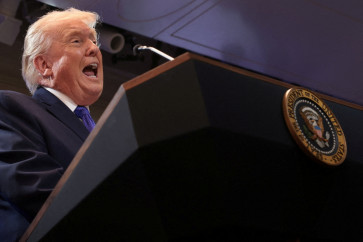Popular Reads
Top Results
Can't find what you're looking for?
View all search resultsPopular Reads
Top Results
Can't find what you're looking for?
View all search resultsEditorial: Risks of monorail derailing
Jakarta Governor Joko 'Jokowi' Widodo rightly decided last month to revive the Jakarta monorail project, which had been mothballed for more than seven years after it was launched in 2003 first with Malaysian Mtrans Holdings Sdn Bhd and then with Omnico from Singapore
Change text size
Gift Premium Articles
to Anyone
J
akarta Governor Joko 'Jokowi' Widodo rightly decided last month to revive the Jakarta monorail project, which had been mothballed for more than seven years after it was launched in 2003 first with Malaysian Mtrans Holdings Sdn Bhd and then with Omnico from Singapore.
But the revival of the US$1.5 billion project seems to have been smooth, without any political noise or controversy, unlike the project in 2004-2007. The public sees the completion of the project as strategically vital to help reduce gridlock in the city of more than 12 million, and Jokowi's impeccable integrity makes the people feel assured that there is no monkey business in his policy decision.
Even though the monorail project is being implemented under a public-private partnership (PPP) plan, it is entirely a private investment without any government guarantee. Hence, no competitive bids and fiscal risk assessments are needed. This means the investor, PT Jakarta Monorail (JM), a joint venture between Singapore-based Ortus Holdings founded by Indonesian businessman Edward Soeryadjaya and PT Indonesia Transit Central, shall be responsible for putting up all the equity and loan financing for the project.
Certainly the project has been assessed as commercially viable, otherwise JM would not have taken the risks and state-run China Communication Construction Co. Ltd., Singapore MRT operators as well as four other foreign companies would not have joined the project as strategic partners.
The elevated monorail, which will consist of two lines, each about 15 kilometers running through Jakarta's central business districts, will be based on a build-operate-and transfer (BOT) contract for 30 years, extendable by 10 years.
Certainly, as with similar projects in Malaysia, China and other countries, the Jakarta monorail project also not be feasible if it only depended on income from tickets because ticket prices should be made affordable for commuters, otherwise the monorail would never achieve its minimum ridership to cover its operating costs.
As stipulated in the BOT contract, JM has been given the right to raise revenue from advertising, media business on the monorail cars, corridors and stations and rental fees from passenger lounges and retail shops in the 30 stations and other ancillary facilities to be built along the 30-km routes. JM also is granted the right to build and operate properties around the 30 stations.
This, we think, could be the caveat that might set off political controversy because no technical details were immediately available as to the radius of the monorail stations and as to whether property could also mean high-rise apartments and office buildings.
Without transparency right from the outset, this project could be derailed by the unnecessary controversy as that hitting the sponsors of the $20 billion Sunda Strait Bridge project, who demanded the right to develop strategic economic zones on either side of the bridge in the southernmost areas of Sumatra and westernmost areas of Java as the main source of income.










